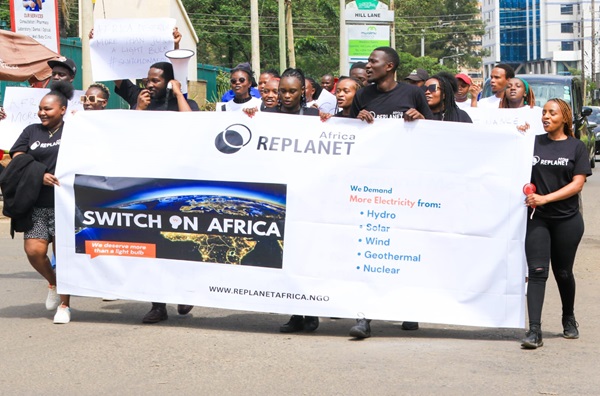
In a proactive move to amplify the call for substantial investment in clean energy across Africa, RePlanet Africa has urged the World Bank to reassess both the scale and pace of its investments in clean energy access for the African continent.
The grassroots environmental movement, orchestrated a demonstration at the World Bank offices in Nairobi, recently as part of the broader “Switch on Africa” campaign, strategically designed to stimulate investments in clean energy, reduce the cost of power, safeguard African women from indoor air pollution and mitigate deforestation by sourcing energy from clean and sustainable sources.
The letter, delivered to the World Bank’s Upper Hill office address in Nairobi on the 6th day of COP28, underscored RePlanet Africa’s plea for the multinational institution to prioritise investments in renewable energy. The organisation urged the bank to collaborate with African governments to develop policies with the capacity to enhance affordable power and ensure its accessibility across the world.
RePlanet Africa highlighted that while the World Bank has been a significant player in financing energy projects in Africa, its approach has predominantly centred on expanding grid infrastructure with insufficient emphasis on affordability. According to the letter, this approach has mainly addressed the basic lighting function.
Director of RePlanet Africa, Patricia Nanteza conveyed the organisation’s message, stating that true energy access extends beyond basic lighting. She urged the World Bank to embrace a more comprehensive definition that includes reliable, sustainable and affordable power sources catering to diverse household needs, including cooking. Nanteza advocated for a diversified energy mix, encompassing nuclear, solar, wind, geothermal and hydroelectric power.
In a symbolic gesture, Nanteza delivered a piece of charcoal to the World Bank pavilion at COP28 in Dubai, reiterating the call made in Nairobi for substantial investments in renewable energy sources on the continent. She emphasised the necessity for energy subsidies and encouraged African governments to exempt liquefied petroleum gas (LPG) from taxes to protect vulnerable populations from heavy dependence on biomass fuels for cooking.
Highlighting the World Bank’s reluctance to fund nuclear energy in the Global South, the letter expressed concern about the negative impact on a continent in need of baseload power for industrial growth and job creation. RePlanet Africa urged the World Bank to take a leadership role in establishing robust regulatory frameworks for nuclear energy projects, prioritising safety and environmental protection.
Despite a decade of growth, Africa still grapples with an energy crisis, with 80 per cent of the population lacking reliable access to energy. The current energy mix on the continent, dominated by fossil fuels and traditional biomass, contributes significantly to greenhouse gas emissions and air pollution.
RePlanet Africa’s advocacy aligns with the imperative to bridge the power generation gap, providing sustainable, affordable and clean energy solutions for Africa’s development. The organisation’s call for increased World Bank investment echoes the urgency to address energy poverty, foster economic growth, and create a more sustainable future for the continent.

